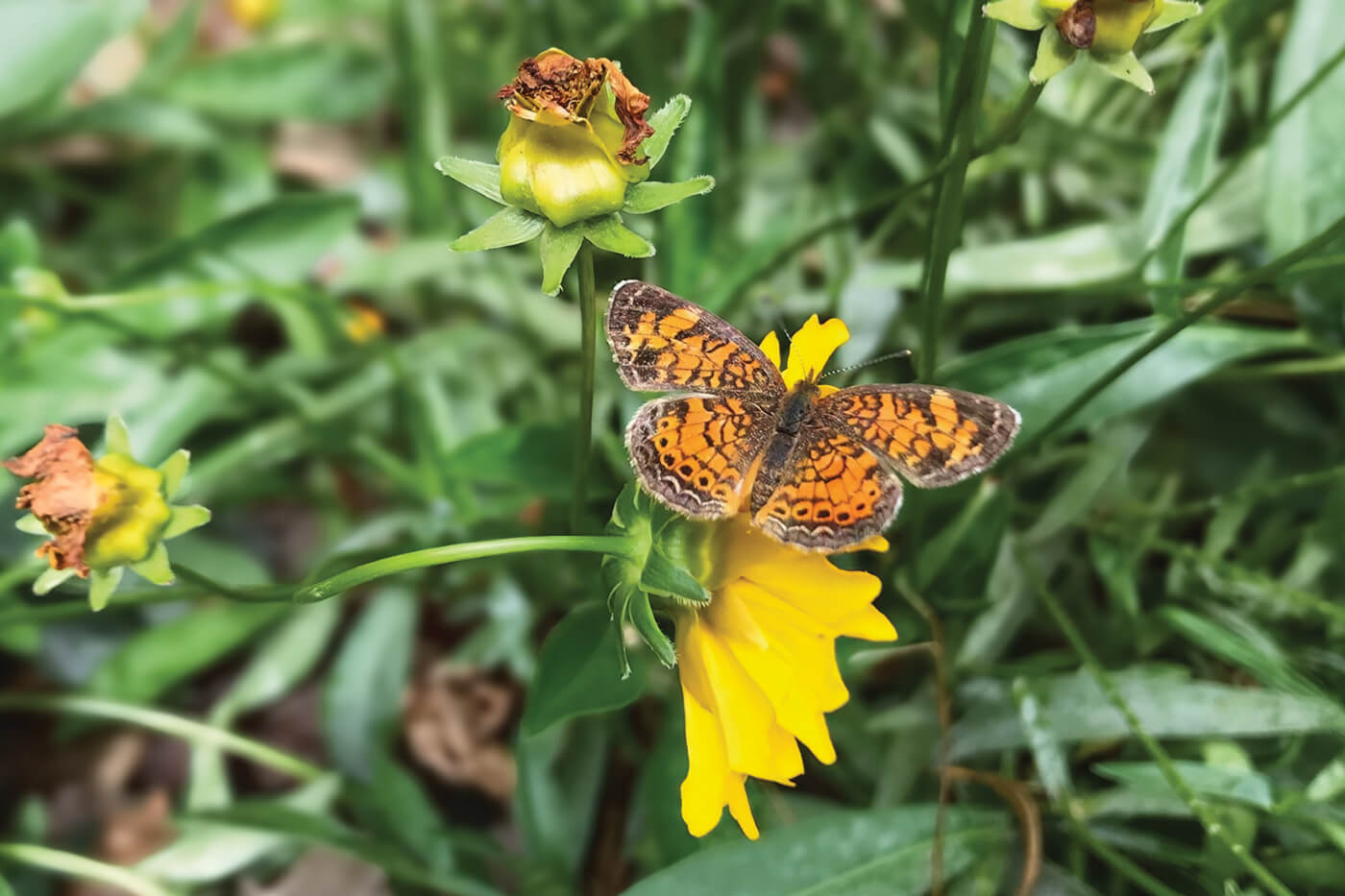Landscape Ontario’s Toronto Chapter Bursary Program supported the growth of pollinator and food gardens alike this year, with many recipients providing a space for kids to get involved in gardening and for Indigenous reconciliation.
Every year, the Chapter offers grants of up to $1,500 to foster the growth of small-scale community projects, totalling $15,000 in contributions. In 2023, 17 community-based projects received funding.
“It’s a way of giving back to the neighbourhoods our members work and live in,” said Matt Gove, Toronto Chapter Bursary Committee member.
“We are looking to support projects that promote wellness, make positive environmental impacts, build community and provide educational experiences for community members. We like to choose the projects that will benefit the most people.”
Though varied in scope, the projects have a common vision: promoting land stewardship, ecological thinking and green space in predominantly urban environments.
Aanjiktigaan
Aanjiktigaan is Anishinaabemowin for “making the garden over again.” It is a space for Indigenous and non-Indigenous peoples to form deeper connections with the land through planting, growing and harvesting food and traditional medicines.
“The intention of our space is to be an important site for not just humans, but all of our relations,” said volunteer Meagan Dellavilla. "When we’re designing or managing the garden, we’re doing so with all of these other beings in mind.” For example, one of the volunteers is a bee researcher who ensures the space promotes pollinators.
The garden has over 60 different native trees, shrubs and plants. The food harvested is shared amongst the volunteers who care for it, neighbours and Fatima House, a local women’s shelter.
Aanjiktigaan also offers healing, community building, and other workshops through which people can exchange knowledge. People of all ages garden in Aanjiktigaan. Dellavilla said volunteers refer to the space as relaxing and inviting.
“Sometimes people even refer to it as a bit of a sanctuary, because there aren’t tons of lush and abundant green spaces in downtown Toronto like this one.”
The bursary from the Toronto Chapter helped purchase supplies to construct raised beds in the garden, providing more room to grow food and medicinal herbs. It also helped purchase soil, compost, garden tools, and seedlings to expand and maintain the garden.
“As a volunteer-led group, having access to funds is so important to us,” said Dellavilla. “It helps us keep the garden really accessible. We’ve been able to purchase more garden tools, even things as simple as garden gloves.”
“That way, no one is prevented from joining us in the garden due to lack of resources. We have everything that people would need when they come to the garden, and I think that adds to it being an inviting and welcoming space for folks.”
Alton Village Association Community Garden Group
The Alton Village Association Community Garden Group works to enhance the environment, character and quality of life in Alton, Ont., by creating a network of community gardens. The group maintains a community garden in the Alton Village Square.
In 2022, the group turned one of the garden’s existing raised beds into a perennial pollinator garden. The project was so successful the group decided to expand it.
The group hired a local builder to construct three raised beds in the square and planted a variety of native perennial and annual plants, pollinator plants and vegetables like squash, cucumbers, peppers, tomatoes and peas.
“We really wanted to support pollinators — butterflies, bees, and other insects — in their natural roles,” said Emily Quinton, community volunteer. “We wanted to educate people on slowly transforming their gardens to be more pollinator friendly.”
The first bed is a Butterflyway garden inspired by the David Suzuki Foundation, dedicated to encouraging local pollinators. The second bed is a Junior Gardeners’ Bed, which children from the local public school help plant and maintain.
The third bed is a Truth and Reconciliation Heart Garden, which is a nod to Indigenous peoples affected by the atrocities committed in residential schools. It contains the Three Sisters plants: beans, squash and corn.
“Everything is growing and flourishing, and it looks really good,” said Quinton.
The group is also producing an informational garden guide in collaboration with Credit Valley Conservation, illustrated by local artist Kayla Jackson. It aims to inspire residents to bring the lessons into their own backyards and get planting. The group is launching the booklet on Sept. 9 during the fall harvest and open house in the square.
Quinton learned about the Toronto Chapter bursary through her friend Matt Gove, who is a member of Landscape Ontario. The funding helped purchase lumber, soil, plants and gardening tools.
“We needed that extra little boost,” said Quinton. “It’s really helped create the welcoming space of learning and experimenting and socializing.”
Bain Co-op
Bain Apartments Housing Co-operative Inc. (Bain Co-op) is a housing provider for low and middle-income people. The organization is using the bursary to re-landscape three street-facing areas of the community in the Riverdale neighbourhood of Toronto.
The goal of the project is to beautify the area and increase residents’ access to green spaces to boost well-being. John Sharkey, Bain Co-op Resident’s Council member, said most people living in urban spaces do not have enough access to nature.
“The natural environment is essential to our mental health,” said Sharkey. “A well-cared for, attractively designed, natural landscape is as important as well-maintained buildings.”
The landscaping project involves salvaged woody plants, native pollinator seeds, cedar mulch, bamboo and other fencing. It will provide cover for wildlife like raccoons, possums, squirrels and birds.
“We are focusing on native pollinator plants in order to encourage the survival of a lot of pollinators who depend on native plants,” said Sharkey.
Bain Co-op also has mature cherry, apple, pear and plum trees, hazelnuts and soft fruit shrubs on site that provide the community with fresh food.
In 2018, Bain Co-op installed an Honour Canoe in its street space to honour the Indigenous peoples affected by the atrocities committed in residential schools. The canoe contains sacred Indigenous healing plants: cedar, sage, tobacco and sweet grass.
Sharkey said this installation inspired the larger beautification project: “Because it was so beautiful, people kept on admiring it, and then we realized we need to do similar work to other street spaces.”
Peter McDonald, Sharkey’s partner on the project, is a member of Landscape Ontario and was aware of the bursary. The funding helped purchase fencing materials, tools, mulch, plants and straw bales.
The re-landscaping project is ongoing and will take two to three years to complete. Sharkey said the bursary was the “inspiration to make it happen.”
“It wouldn’t have happened unless we had that grant — it’s as simple as that. It was just enough to get us started and motivate us to keep going.”
Christie Refugee Welcome Centre
 The Christie Refugee Welcome Centre is an emergency shelter in Toronto that services refugee families. The organization built a community garden in its back parking lot in 2021 to provide families with access to green space, urban gardening, and fresh produce.
The Christie Refugee Welcome Centre is an emergency shelter in Toronto that services refugee families. The organization built a community garden in its back parking lot in 2021 to provide families with access to green space, urban gardening, and fresh produce.
“It’s been a really special project to be part of. It’s really nice to see the families outside and taking their minds off some of the bigger issues they’re going through,” said Denise Hansen, who coordinates the organization’s communications, engagement and volunteer functions.
The garden is also home to children’s programming. Kids plant seeds in pots, keep them in their rooms, transfer them to the garden beds and water them twice daily.
The shelter runs weekly gardening sessions to teach children about gardening, plant identification and pollinator plants. One of the planters is a dedicated pollinator garden to support the bee population.
“We really want to show [the children] the importance of sustainability. The garden is a really important component in teaching issues around climate change and what we can do to contribute to a greener world,” Hansen said. “It’s also nice to see their excitement when they pull up a carrot or find a red tomato. It’s been pretty special.
In 2023, the garden is growing tomatoes, beans, lettuce, squash, carrots, red onions and herbs like chives, basil and oregano for refugee families. The harvested produce is used in the centre’s kitchen and families can also take some home.
“Our cook incorporates them into the meals. A bunch of tomatoes and beans were recently given to her, and she made a salad incorporating them. And we had a whole bunch of lettuce that was given to her, and she incorporated that into a stew,” said Hansen.
The bursary helped purchase vegetable and herb seeds and seedlings, soil and gardening tools.
“We’re grateful for the bursary to have that opportunity to continue this project,” said Hansen. “It gives families something meaningful to be a part of while they’re here at the shelter.”
Fred Victor
 Fred Victor works to improve health, income and housing stability for unhoused people and people living in poverty. One of its services is its Community Food Gardening Program, which is turning the neighbourhood of Regent Park, Toronto, into a massive urban farm.
Fred Victor works to improve health, income and housing stability for unhoused people and people living in poverty. One of its services is its Community Food Gardening Program, which is turning the neighbourhood of Regent Park, Toronto, into a massive urban farm.
Fred Victor maintains 269 allotment gardens for individuals and families, and four communal gardens across the area. People grow and harvest their chosen produce — like tomatoes, kiwis and zucchinis — and the organization provides oversight and support.
“It has become a real staple in the Regent Park community,” said Alexa Swaby, manager of foundations and community giving. “It gives people such a great attachment to the food that they’re consuming.”
Fred Victor also runs educational workshops in the garden to teach people about growing food, how to cook affordable meals using fresh produce, and the importance of gardening and environmental stewardship.
A portion of the vegetables and herbs grown in the communal gardens are used in Fred Victor’s greater food security program, including the free meals it distributes daily — totalling approximately 200,000 meals per year.
“Our garden coordinator will say, ‘Oh, I have however many pounds of garlic — use it!’ And our head chef will develop these great recipes,” said Swaby.
Another important aspect of the program is community. Swaby said the Regent Park community is extremely diverse, and growing food in the garden brings together people of many different cultures and traditions.
“Food is something that is meant to be shared, and there’s a reason why at most holidays people come together around food. It is so important.”
The bursary helped support the program’s daily operational expenses, like soil, compost, seedlings and gardening tools — which make the garden accessible for everybody.
“Our entire food program is donor funded, and we are always looking to fund different aspects of it because it is so crucial to the populations that we serve,” said Swaby. “We’re really thankful to have these bursaries that allow us to keep this program running.”
Joyce Public School
 Joyce Public School is a kindergarten to grade six school in North York, Ont., that revamped its outdoor green space in 2023. The school constructed four gardens: a tire garden, a pollinator garden, a vegetable garden and a Haudenosaunee Three Sisters Garden with corn, beans and squash.
Joyce Public School is a kindergarten to grade six school in North York, Ont., that revamped its outdoor green space in 2023. The school constructed four gardens: a tire garden, a pollinator garden, a vegetable garden and a Haudenosaunee Three Sisters Garden with corn, beans and squash.
The plants in the tire garden and pollinator garden are native to the Toronto area. The spaces include educational signage to teach the students about the benefits of pollinators, identifying plants and the Haudenosaunee story of the Three Sisters.
While the seeds in the vegetable garden did not grow as well as hoped, the school pivoted quickly, turning it into an herb garden with lavender, dill, basil, mint, chives, bay leaves and oregano. The harvest will be shared with the children and the school’s daycare.
Andrea Brow, a teacher at the school who oversees the garden project, said it is so important because many of the school’s students live in apartment buildings with limited access to green space. She said it is really beautiful to see them engage with the garden.
“There were times when I’d give them bins of dirt and you see how happy they are, just digging in the dirt and getting their hands dirty.”
Brow’s grade one class took a field trip to Home Depot to pick out the seeds for the garden and helped plant them.
“They got to see the whole life cycle,” said Brow. “When they come back [from summer vacation], they are going to be thrown because the corn is taller than them.”
Landscape Ontario member Tullia Marcolongo designed the garden pro-bono and brought the bursary to Brow’s attention. The funding was the foundation of the garden: the school used it to purchase plant material, seeds, soil, compost, planters, and gardening materials like hoses and stakes.
“We couldn’t have done it if we didn’t get the bursary. It wouldn’t have happened. But it’s so important for these children,” said Brow. “It’s curriculum related, it’s good for our mental health, it’s good to be outside and it’s fun!”
Oakvillegreen
Oakvillegreen is an environmental conservation charity in Oakville, Ont., that works to enhance natural diversity and green spaces and reconnect residents to the land. It plants trees and native plants, builds rain gardens and removes invasive species.
The organization received funding from the Toronto Chapter to expand its two existing gardens: Kingsford Gardens and Butterfly Wing Garden, both in Oakville. It plans to increase Kingsford by 150 square metres and Butterfly Wing by 50 square metres by mass planting native perennials in September 2023.
“The best part with the Landscape Ontario funding is we can spend the money solely on the plant material, which is getting more expensive,” said Karen Brock, president.
The organization encourages community members to get involved with the planting, weeding and stewardship of the garden. Oakvillegreen also collects the seeds produced from the plants and shares them with their members to plant in their own gardens.
“I think more and more people are tuning in to the biodiversity crisis, and the fact that they can do something in their own backyard, so we try to empower them by using our gardens as demo gardens,” said Brock.
Oakvillegreen will host youth volunteer events to involve Oakville residents in this expansion, engaging them in weeding, watering and mulching. The gardens are also close to several elementary schools, providing outdoor learning opportunities.
The organization also plans to install educational signs to teach visitors about the pollinators in the gardens, which will benefit the crop yields of nearby community gardens.
The bursary will help purchase native plants — sourced from nurseries — including wild lupine, bee balm, butterfly milkweed, blazing star, coneflowers, prairie cinquefoil, prairie smoke, black-eyed Susans, little blue stem, Indian grass, switch grass, Canada wild rye, fox sedge and hop sedge.
“We love planting more plants, and the grant makes it possible,” said Brock. “It gives us a boost, and our gardens a boost.”
Rockford Community Garden
Founded in 2009, the Rockford Community Garden is located in the Bathurst-Finch neighbourhood of Toronto. It is owned by the City of Toronto but maintained by gardeners living in the neighbourhood, who plant vegetables and flowers in plots.
“People can grow their own food, which is of a better quality. Also, we create a community — people meet and talk to each other. It also teaches people about native plants and why they’re important for the bees and the ecosystem,” said Milena Brankova, coordinator.
The team received funding to extend the existing pollinator garden — built in 2019 — and construct another, called the Shade Pollinator Garden. The garden introduced native flowers, grass and shrubs like butterfly milkweed, wild geranium and blue-eyed grass.
“We saw an opportunity to expand the plot, and the main thing was to plant native to Ontario plants,” said Brankova.
The garden also has an educational component: visitors learn which species are native to Ontario and how they benefit native pollinators. Brankova said native plants provide more nutrients and a better habitat for local birds and insects.
Rockford Public School is nearby, making the garden an opportunity for students to learn about environmental stewardship. Children from the daycare also have a plot in the garden growing beans and cucumbers.
Brankova first engaged with Landscape Ontario through the GROW program, which she said is “amazing.” She learned of the bursary in a Landscape Ontario newsletter.
The funding helped purchase the native flowers, grass and shrubs from NVK Nurseries. Prior to receiving the bursary, the garden did not have any native plants.
“We have plants that we didn’t have before, and I want to spread them, because it’s obvious the bees prefer them. Now I want to teach people that it’s better to plant native stuff. And it’s beautiful — the plants are beautiful,” said Brankova.
The Stop
 The Stop tackles food insecurity by connecting low-income Toronto residents to good food in dignified spaces, providing free meals, connecting Torontonians to resources and empowering them to grow their own food.
The Stop tackles food insecurity by connecting low-income Toronto residents to good food in dignified spaces, providing free meals, connecting Torontonians to resources and empowering them to grow their own food.
Their Mashkikiiaki’ing (Medicine Earth) Garden, or Indigenous Community Garden, is one of The Stop’s three community gardens, located in Hillcrest Park in Toronto. It is the first Indigenous-led garden in Toronto; The Stop stewards it in partnership with Na-Me-Res, an Indigenous men’s residence.
“It is under the leadership and direction of the Indigenous community, so it really prioritizes their needs and desires. It’s really reflected in the plants that are grown there, and the layout of the garden,” said Hilda Nouri, The Stop urban agriculture manager, referencing the garden’s Medicine Wheel design.
The garden aims to support Na-Me-Res residents and programming participants. The garden helps Indigenous participants re-connect with their land and culture through planting and harvesting produce. It is also a place for gathering and ceremonies.
The garden grows over 35 different varieties of vegetables, fruits, flowers and pollinator species, including beans, squash and corn. Participants also grow culturally significant plant medicines, like tobacco, sage, sweet grass and cedar.
The food harvested is distributed between participants and used to make meals for The Stop and Na-Me-Res programming. The garden also hosts two open houses each year for the public to learn more about urban food production and Indigenous ways of knowing.
“It also serves as a learning space for non-Indigenous folks to learn more about Indigenous culture through plants and food. It’s a really great connector and first step to connect with new people,” said Nouri.
The bursary helped expand the garden to produce more food through constructing four raised beds. It helped purchase seeds, plants, soil, compost, organic soil amendments, garden gloves and trowels.
“It’s really increased our capacity to grow food,” said Nouri. “It was also a learning opportunity because our staff who are Indigenous got to build the garden beds. It was a really lovely experience to build the beds together, and it led towards a feeling of pride.”
Thorncliffe Park Women’s Committee
The Thorncliffe Park Women’s Committee works to empower women to build stronger communities in the Thorncliffe Park neighbourhood in Toronto. It maintains the Thorncliffe Family Garden in R.V. Burgess Park, which engages local families in urban gardening.
“Our garden is an asset to the neighbourhood,” said Sabina Ali, Thorncliffe Park Women’s Committee executive director. “It is very, very important, especially in the low-income neighbourhoods where there are issues of food security.”
The garden has individual plots for growing produce and a few plots that grow herbs and lettuce for the committee’s café in the park — a social enterprise inspiring community in the area. It also includes a pollinator garden and a children’s learning garden.
“In the immigrant communities, it is one of the ways to come out and meet your neighbours. It’s a place of socializing, gaining knowledge and learning about the plants. It’s an important place,” said Ali.
“The garden has a healing effect when you’re working with Mother Nature. Especially after a pandemic when people are stuck at home, it’s really important that they come out.”
In July and August, the committee hosts drop-in programming in the children’s garden to teach local children where food comes from and how to grow it. The kids plant, water and harvest vegetables and herbs and take them home to eat.
Classes from the nearby Thorncliffe Park Public School visit the garden during the school year. Volunteers and staff develop programming in the garden related to the Ontario curriculum to teach elementary students about nature, pollinators, healthy living and environmental stewardship.
The bursary helped purchase three raspberry bushes, 20 strawberry plants, soil, garden tools, vegetable and herb seedlings and 12 native pollinator plants, including milkweed and black-eyed Susans.
“Any kind of support is really appreciated, and this funding really helped us in running the garden,” said Ali.
Ubuntu Community Collective
Ubuntu Community Collective is a non-profit co-operative in North York, Ont., that serves African, Caribbean and Black families in Toronto. Its values are grounded in the African concept of Ubuntu, which means ‘I am because we are.’
The collective runs the Ubuntu Community Farm, a half-acre market garden — a small-scale farm that sells produce directly to consumers — on land leased from Parks Canada. It grows a variety of vegetables and herbs, including zucchini, potatoes, peppers, eggplants, onions, cucumbers, okra, parsley and basil. Many of these varieties are native to the region.
“We’re trying to change the food system to feed our community,” said Judith Prince, director and lead farmer. “I think it’s really important to grow what would actually grow in this environment.”
The organization sells the produce and herbs grown in the garden at a stand on the farm, giving the community greater access to fresh produce and connection with the land.
“We’re trying to build this farm as a social enterprise, to provide access to fresh, healthy food for families, especially the families we serve,” Prince said. “It’s important because I’m serving families of the African diaspora, and we have a hard time accessing our cultural foods. To be able to grow it locally — it really helps.”
The organization also provides volunteer opportunities for community members to help with food production and learn about urban farming. It plans to run workshops on planting, harvesting, seed keeping and medicine making.
The bursary helped jump-start the farm’s community medicinal herb garden, which will educate people about herbal medicine and act as another community space.
It also helped purchase perennial seedlings, organic soil amendments, tools and supplies so more community members can participate.
“It’s always amazing to get any contribution,” said Prince. “This bursary was really helpful to set the foundation for building community on the farm — just to have the tools ready.”
Urban Farm Initiative
 Urban Farm Initiative creates community gardens to tackle food insecurity across the GTA. Its gardens produce fresh produce, which is given to local food banks, low-income households, persons with disabilities and newcomers to Canada.
Urban Farm Initiative creates community gardens to tackle food insecurity across the GTA. Its gardens produce fresh produce, which is given to local food banks, low-income households, persons with disabilities and newcomers to Canada.
In 2023, the organization built a community garden on the land of the Unionville Alliance Church in Markham, Ont., which was previously an open meadow. One of Urban Farm Initiative’s goals is to convert as much underutilized land as possible and make it productive.
“The land was dormant for 30 years, so the church didn’t utilize it at all. There are native pollinator plants in the acreage — there’s so many butterflies, and all these pollinator insects,” said Januja Jeyarajah, Urban Farm Initiative executive director.
The bursary from the Toronto Chapter helped construct the garden, funding the purchase of lumber, soil amendments, seeds, water, tools and other construction materials.
So far, the organization has optimized about 80 per cent of the allocated 3,000 square feet. The garden grows peppers, spinach, tomatoes, radishes, green beans, yellow beans, and herbs like oregano and basil.
“We’re really impressed with the results. We started growing in mid-July, and we’ve already generated a lot of produce from just a small space,” said Jeyarajah.
Urban Farm Initiative donates all the produce to the church’s Master’s Pantry food bank, which feeds about 200 families, and the Markham Food Bank, which feeds about 600 families. So far, the organization has donated 20 kilos of produce.
“When I talked to the Markham Food Bank this year, they said a lot more people are using the food banks because of food prices and inflation going up. There’s a huge demand for organic produce,” said Jeyarajah.
The organization is looking to expand the garden further in 2024, to encompass 6,000 to 7,000 square feet of land. As the garden continues to grow, Urban Farm Initiative will increase their outreach to get community members involved in the garden.
“Our hope is for them to understand food shortages and food waste, and how food is grown in Ontario, so we can reduce the amount of food waste,” said Jeyarajah.
West Neighbourhood House
West Neighbourhood House’s Greenest City program promotes urban agriculture, health, community engagement, Indigenous cultural work and environmental justice in Toronto, Ont.
The Toronto Chapter bursary funding supported the organization’s new pollinator garden, which is labelled in both English and Ojibwe as a part of the agency’s writing relations work with Indigenous community members. The growing plants include bergamot, purple cone flowers, tickseed, oak sedge, sunchoke and butterfly milkweed.
Angela ElzingaCheng, manager of Greenest City, said it is essential to increase the biodiversity of urban green spaces — which are typically composed of just grass — to support local pollinators and the health of the environment in general.
“One of our catchphrases is ‘thriving Earth, thriving people.’ So, when we take care of the Earth and we take care of the pollinators and the land around us, we also have thriving people,” she said.
The funding also contributed to the agency’s Growing the Future Kids Program. The children and families who participate in the program meet weekly over the spring and summer in two community gardens — the Hope Garden and Milky Way Garden — in Parkdale, Toronto.
They learn about gardening, environmental stewardship, seed saving, healthy eating and pollinator plants through growing and harvesting vegetables including tomatoes, kale, lettuce, cucumbers, chard and peppers.
ElzingCheng said this program is really important for the kids’ own lives, as they have a tangible way of connecting with the Earth, and for the future, as it teaches the next generation of land stewards the importance of urban gardening.
“Being able to learn young what it means to take care of the Earth is really important,” she said. “We want them to be able to take that with them through the rest of their lives. We have kids who have grown all the way into adults who take care of the Earth.”
West Neighbourhood house learned of the Toronto Chapter bursary — which ElzingaCheng said definitely contributed to the agency’s impact — through the Toronto Urban Growers Group. The funding helped purchase plants, seeds, soil, a plant labelling system, tools, gardening accessories and healthy snacks for the kids program.
Applications for the 2024 Toronto Chapter Bursary Program will open in early February and close in March. Stay tuned to horttrades.com/tag/toronto for details and updates.











